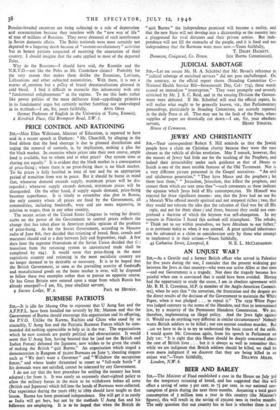JEWRY AND CHRISTIANITY
Sirt,—Your correspondent -Robert S. Hill reminds us that the Jewish people have a claim on Christian charity because they were the race chosen as the vehicle of divine revelation. May I remark, however, that the masses of Jewry had little use for the teaching of the Prophets, and indeed their intractability under such guidance as that of Moses or Isaiah is one of the most notable features of the Old Testament: Nor is a very different picture presented in the Gospel narratives. "An evil and adulterous generation," " They have Moses and the prophets ; let them hear them," " Jerusalem, Jerusalem, that killest the prophets, and stonest them which are sent unto thee "—such comments as these indicate the opinion-which Jesus held of His contemporaries. He Himself was rejected for three significant reasons: one, that the Jews had no use for a Messiah Who offered merely spiritual and not temporal riches ; two, that they would not tolerate the idea that the salvation of God was for all His
aople, and not for them alone rand 'three, because they could not com- prehend a doctrine of which the keynote was self-abnegation. In my sojourn in Palestine I found this outlook still triumphant. The rebuke, " Think not to say within yourselves, we have Abraham to. our father," is as pertinent today as when it was uttered. A great spiritual inheritance can be advanced as a claim to consideration only by those who attempt to implement it in their actions.—Yours faithfully,






























 Previous page
Previous page